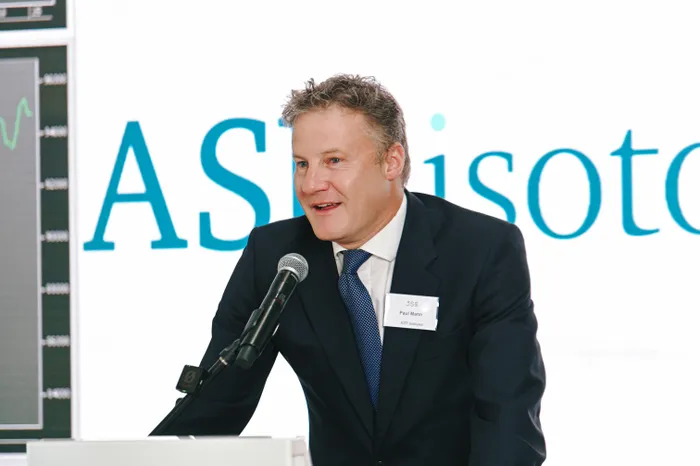
ASP Isotopes chairman and CEO Paul Mann. The company achieved a secondary listing on the JSE on August 27, 2025.
Image: Supplied
ASP Isotopes (ASPI), the Nasdaq-listed isotopes enrichment company that has most of its team operating in South Africa, and which is acquiring Renergen, listed on the JSE on Wednesday.
Just after midday Wednesday, the share price on the JSE represented an 18% premium to the $10.47 share price on the Nasdaq at the close of trade Tuesday - a trader said the volumes were thin, but there was definitely demand for the shares.
“While our capital footprint has expanded into the US and Europe, the core of our company is rooted in South Africa. With most of our team and operational assets based locally…listing on the JSE is not just a strategic move; it is a tribute to the nation which has world-class talent and institutional knowledge in all our core competencies,” said ASPI chairman and CEO Paul Mann.
The company develops technology and processes to enrich isotopes that can be used in the medical, semiconductor, and green energy (nuclear) industries, technology that has been born out of years of research and development, originally in South Africa.
The company will retain its primary listing on the Nasdaq, where it first listed in 2022. It is in the process of acquiring South Africa’s only commercial onshore gas company, Renergen, which has begun commercial production of helium and liquid natural gas.
The acquisition is by way of a scheme of arrangement, under which Renergen shareholders will receive 0.09196 new ASP Isotopes shares for each Renergen share held - Renergen’s shareholders approved the scheme on July 10, 2025.
“Both isotopes and helium are viewed by almost every Western government as critically and strategically important materials. The combination of these two businesses will create a company with huge strategic value and a vital part of a fragile supply chain,” said Mann.
The combination would create a global leader in the production of critical and strategically important materials, including electronic gases such as helium, various fluorinated products, and isotopically enriched gases.
The Renergen transaction was expected to be “highly accretive” to ASPI’s revenue, EBITDA (earnings before interest, tax, depreciation, and amortisation), earnings per share, and cash flow per share, starting from 2026.
ASPI is also preparing to spin-out of Quantum Leap Energy (QLE) as a separate public company.
“The creation of two independent companies is driven by the different regulatory landscapes, supply chains, and funding requirements for the production of nuclear fuel and medical and industrial isotopes. However, there will be a number of ongoing commercial agreements between the two companies,” said Mann.
The acquisition of Renergen was expected to close in the third quarter of 2025, prior to the spin-out of QLE, which was still expected to occur during the second half of 2025.
Mann said favourable long-term market trends were anticipated to drive sustained industry growth, while recent geopolitical events had heightened the urgency for companies and countries to seek out reliable sources of enriched isotopes.
ASPI had completed the construction of three manufacturing facilities and was continuing to expand its operating footprint in South Africa. Its targets included securing at least three additional supply agreements for isotopes critical for new technologies and healthcare.
During 2025, the company said it had progressed the start of commercial production of isotopes at its enrichment facilities in Pretoria, and it also began constructing the first isotope enrichment facility outside of South Africa, with 100% renewable electricity supply, advantageous energy costs, and a reliable supply.
BUSINESS REPORT